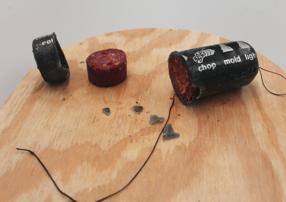RIZO
RIZO
| School: | GA Tech |
| Team: | Katherine Freeman, Arie Rimeris |

RIZO is a concept for repackaging chorizo in a way that erases the notion that shelf-stable meats are overly processed and unnatural, portraying the snack as a fresher, more-healthy food that can be easily incorporated into a consumer’s everyday diet. The packaging for RIZO consists of only twine made from 100% soy fiber thread and soy wax infused with activated charcoal. Even the graphics on the product are created by overlaying undyed wax on the surface of the product. The twine is wrapped around the sausage in loops at regular intervals, separating it into sections that can be easily sliced by that same twine. The sausage is then dipped in the melted soy wax to create a hermetic, protective coating, leaving both a loop of twine exposed at the top and a small string exposed at the bottom. The bottom string is used to peel through each layer of wax, exposing it portion by portion, and the loop at the top allows the snack to be clipped with a carabiner to a backpack or purse for portability. Once the initial slice is peeled and cut, the leftover wax forms a “cap” that can be used to reseal the sausage. Both the soy wax and the twine are made from all-natural ingredients that can be instantly repurposed by molding the used wax around the twine which serves as a wick. This way, the packaging creates no actual waste because every aspect of it can be used and transformed into something else. This encourages recycling by making it a fun activity that instantly rewards the user with a candle. The activated charcoal in the wax has mold-preventing properties that can extend the shelf-life of the sausage while giving the wax its iconic black color which consumers associate with high-end products. This combats the preconceived idea that shelf-stable meats are somewhat cheap and unsophisticated and rebrands the snack as more elegant, artisanal, and eco-friendly. This will encourage people who already lead healthy, environmentally conscious lifestyles to incorporate shelf-stable meat into their everyday diet. In addition, it will promote more ecological habits in consumers who already purchase similar products
